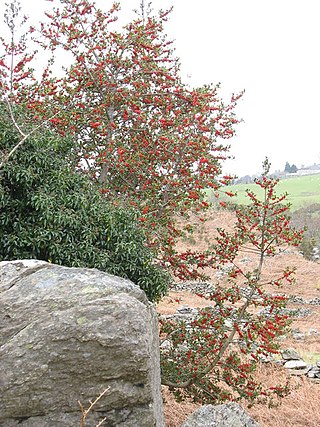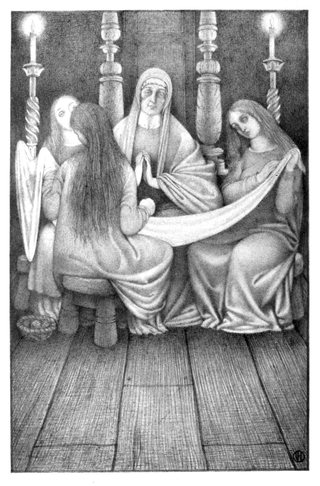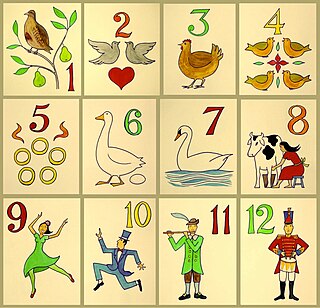
"Barbara Allen" is a traditional folk song that is popular throughout the English-speaking world and beyond. It tells of how the eponymous character denies a dying man's love, then dies of grief soon after his untimely death.

"Lord Randall", or "Lord Randal", is an Anglo-Scottish border ballad consisting of dialogue between a young Lord and his mother. Similar ballads can be found across Europe in many languages, including Danish, German, Magyar, Irish, Swedish, and Wendish. Italian variants are usually titled "L'avvelenato" or "Il testamento dell'avvelenato", the earliest known version being a 1629 setting by Camillo il Bianchino, in Verona. Under the title "Croodlin Doo" Robert Chambers published a version in his "Scottish Ballads" (1829) page 324
"Foggy Dew" or "Foggy, Foggy Dew" is an English folk song with a strong presence in the South of England and the Southern United States in the nineteenth century. The song describes the outcome of an affair between a weaver and a girl he courted. It is cataloged as Laws No. O03 and Roud Folk Song Index No. 558. It has been recorded by many traditional singers including Harry Cox, and a diverse range of musicians including Benjamin Britten, Burl Ives, A.L. Lloyd and Ye Vagabonds have arranged and recorded popular versions of the song.

"Matty Groves", also known as "Little Musgrave and Lady Barnard" or "Little Musgrave", is a ballad probably originating in Northern England that describes an adulterous tryst between a young man and a noblewoman that is ended when the woman's husband discovers and kills them. It is listed as Child ballad number 81 and number 52 in the Roud Folk Song Index. This song exists in many textual variants and has several variant names. The song dates to at least 1613, and under the title Little Musgrave and Lady Barnard is one of the Child ballads collected by 19th-century American scholar Francis James Child.
"I Saw Three Ships " is an English Christmas carol, listed as number 700 in the Roud Folk Song Index. The earliest printed version of "I Saw Three Ships" is from the 17th century, possibly Derbyshire, and was also published by William Sandys in 1833. The song was probably traditionally known as "As I Sat On a Sunny Bank", and was particularly popular in Cornwall.
"We Wish You a Merry Christmas" is an English Christmas carol, listed as numbers 230 and 9681 in the Roud Folk Song Index. The famous version of the carol is from the English West Country.

"The Holly and the Ivy" is a traditional British folk Christmas carol, listed as number 514 in the Roud Folk Song Index. The song can be traced only as far as the early nineteenth century, but the lyrics reflect an association between holly and Christmas dating at least as far as medieval times. The lyrics and melody varied significantly in traditional communities, but the song has since become standardised. The version which is now popular was collected in 1909 by the English folk song collector Cecil Sharp in the market town of Chipping Campden in Gloucestershire, England, from a woman named Mary Clayton.

"The Raggle Taggle Gypsy", is a traditional folk song that originated as a Scottish border ballad, and has been popular throughout Britain, Ireland and North America. It concerns a rich lady who runs off to join the gypsies. Common alternative names are "Gypsy Davy", "The Raggle Taggle Gypsies O", "The Gypsy Laddie(s)", "Black Jack David" and "Seven Yellow Gypsies".

"Young Beichan", also known as "Lord Bateman", "Lord Bakeman", "Lord Baker", "Young Bicham" and "Young Bekie", is a traditional folk ballad categorised as Child ballad 53 and Roud 40. The earliest versions date from the late 18th century, but it is probably older, with clear parallels in ballads and folktales across Europe. The song was popular as a broadside ballad in the nineteenth century, and survived well into the twentieth century in the oral tradition in rural areas of most English speaking parts of the world, particularly in England, Scotland and Appalachia.

Lord Thomas and Fair Annet, also known as Lord Thomas and Fair Eleanor, is an English folk ballad.
"Fair Margaret and Sweet William" is a traditional English ballad which tells of two lovers, of whom either one or both die from heartbreak. Thomas Percy included it in his folio and said that it was quoted as early as 1611 in the Knight of the Burning Pestle. In the United States, variations of Fair Margaret have been regarded as folk song as early as 1823.
Here We Come A-wassailing, also known as Here We Come A-Christmasing,Wassail Song and by many other names, is a traditional English Christmas carol and New Year song, typically sung whilst wassailing, or singing carols, wishing good health and exchanging gifts door to door. It is listed as number 209 in the Roud Folk Song Index. Gower Wassail and Gloucestershire Wassail are similar wassailing songs.
"Blacksmith", also known as "A Blacksmith Courted Me", is a traditional English folk song listed as number 816 in the Roud Folk Song Index.

"The Twelve Days of Christmas" is an English Christmas carol. A classic example of a cumulative song, the lyrics detail a series of increasingly numerous gifts given on each of the twelve days of Christmas. The carol, whose words were first published in England in the late eighteenth century, has a Roud Folk Song Index number of 68. A large number of different melodies have been associated with the song, of which the best known is derived from a 1909 arrangement of a traditional folk melody by English composer Frederic Austin.
The "Sans Day Carol", also known as "St. Day Carol" and "The Holly Bears a Berry", is a traditional Cornish Christmas carol named after the Cornish village of St Day, where it was found around the turn of the twentieth century. The song, which is listed as no. 35 in the Oxford Book of Carols, is very closely related to the more famous carol "The Holly and the Ivy". According to the Roud Folk Song Index, the "Sans Day Carol" and "The Holly and the Ivy" are variants of the same song.
"The Trees They Grow So High" is a British folk song. The song is known by many titles, including "The Trees They Do Grow High", "Daily Growing", "Long A-Growing" and "Lady Mary Ann".
Dives and Lazarus is traditional English folk song listed as Child ballad 56 and number 477 in the Roud Folk Song Index. It is considered a Christmas carol and based on the parable of the rich man and Lazarus. The song traditionally used a variety of tunes, but one particular tune, published by Lucy Broadwood in 1893 and used in other traditional songs, inspired many notable works and appeared in several pieces composed by Ralph Vaughan Williams.
The song "All Around my Hat" is of nineteenth-century English origin. In an early version, dating from the 1820s, a Cockney costermonger vowed to be true to his fiancée, who had been sentenced to seven years' transportation to Australia for theft and to mourn his loss of her by wearing green willow sprigs in his hatband for "a twelve-month and a day", the willow being a traditional symbol of mourning. The song was made famous by Steeleye Span in 1975, whose rendition may have been based on a more traditional version sung by John Langstaff.
"The Farmer's Boy" is a traditional English folk song or ballad, listed as number 408 in the Roud Folk Song Index. It has been arranged as a military march.
Cob coaling, cob-a-coaling or cob calling was a traditional Bonfire Night custom practiced in the Yorkshire-Lancashire border region, which involved going door-to-door in groups and singing a song in return for Bonfire Night supplies. In more recent times, singers collected firewood and money for fireworks, but "coaling" refers to the coal that would previously have been collected. The Cob Coaling Song is listed as number 9234 in the Roud Folk Song Index.







